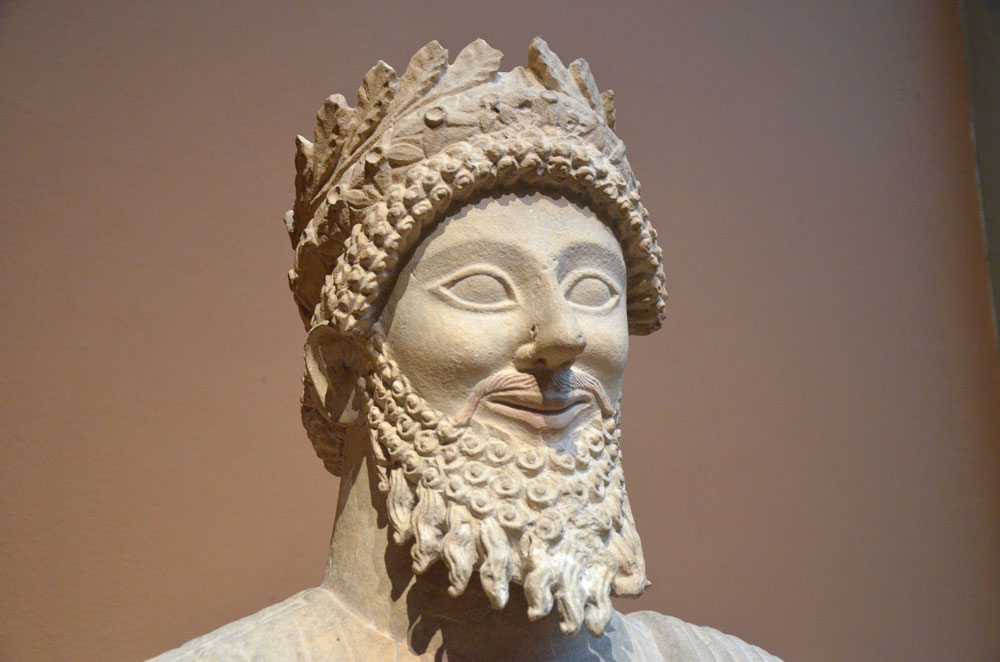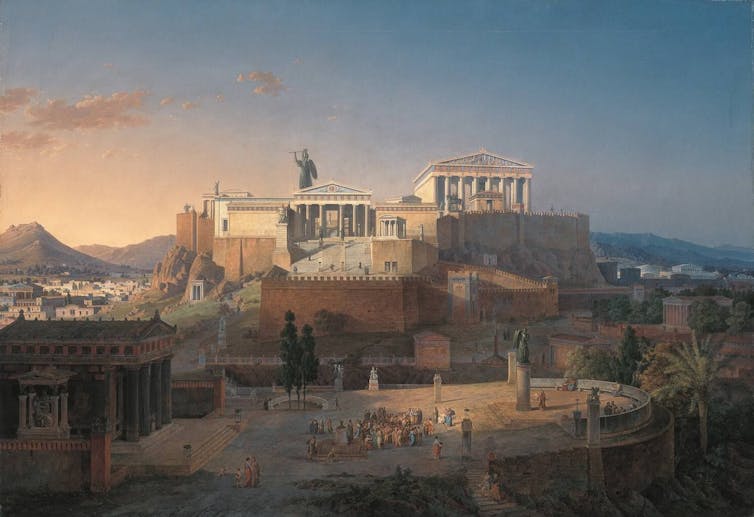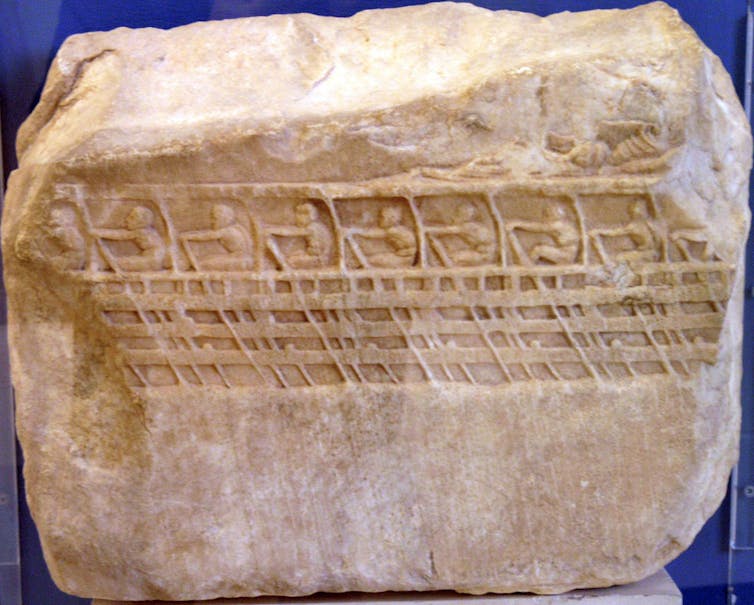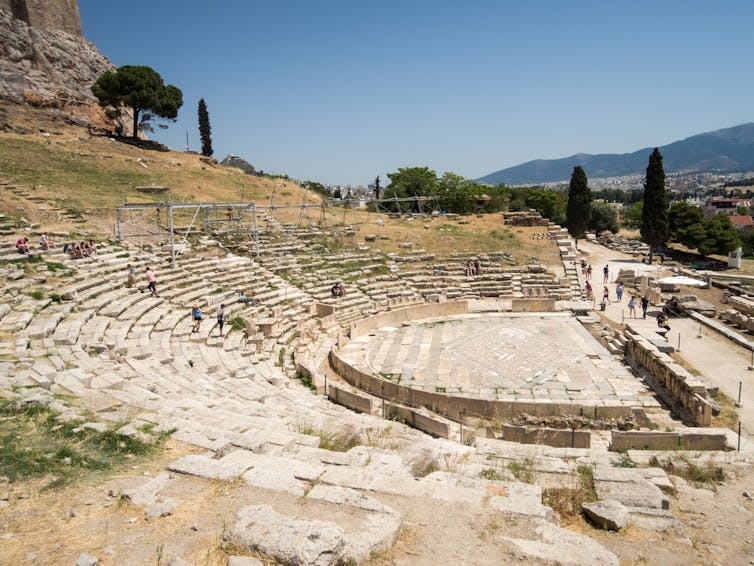
By Thomas Martin
In ancient Athens, only the very wealthiest people paid direct taxes, and these went to fund the city-state’s most important national expenses – the navy and honors for the gods. While today it might sound astonishing, most of these top taxpayers not only paid happily, but boasted about how much they paid.
Money was just as important to the ancient Athenians as it is to most people today, so what accounts for this enthusiastic reaction to a large tax bill? The Athenian financial elite felt this way because they earned an invaluable payback: public respect from the other citizens of their democracy.

Leo von Klenze via Wikimedia Commons
Modern needs, modern finances
Athens in the fifth and fourth centuries B.C. had a population of free and enslaved people topping 300,000 individuals. The economy mostly focused on international trade, and Athens needed to spend large sums of money to keep things humming – from supporting national defense to the countless public fountains constantly pouring out drinking water all over the city.
Much of this income came from publicly owned farmland and silver mines that were leased to the highest bidders, but Athens also taxed imports and exports and collected fees from immigrants and prostitutes as well as fines imposed on losers in many court cases. In general, there were no direct taxes on income or wealth.
As Athens grew into an international power, it developed a large and expensive navy of several hundred state-of-the-art wooden warships called triremes – literally meaning three-rowers. Triremes cost huge amounts of money to build, equip and crew, and the Athenian financial elites were the ones that paid to make it happen.

Marsyas via Wikimedia Commons, CC BY
The top 1% of male property owners supported the saving or salvation of Athens –called “soteria” – by performing a special kind of public service called “leitourgia,” or liturgy. They served as a trireme commander, or “trierarch,” who personally funded the operating costs of a trireme for an entire year and even led the crew on missions. This public service was not cheap. To fund their liturgy as a trierarch, a rich taxpayer spent what a skilled worker earned in 10 to 20 years of steady pay, but instead of dodging this responsibility, most embraced it.
Running warships was not the only responsibility the rich had to national defense. When Athens was at war – which was most of the time – the wealthy had to pay contributions in cash called “eisphorai” to finance the citizen militia. These contributions were based on the value of their property, not their income, which made them in a sense a direct tax on wealth.

dronepicr via Wikimedia Commons, CC BY
To please the gods
To the ancient Athenians, physical military might was only part of the equation. They also believed that the salvation of the state from outside threats depended on a less tangible but equally crucial and costly source of defense: the favor of the gods.
To keep these powerful but fickle divine protectors on their side, the Athenians built elaborate temples, performed large sacrifices and organized lively public religious festivals. These massive spectacles featured musical extravaganzas and theater performances that were attended by tens of thousands of people and were hugely expensive to throw.
Just as with trieremes, the richest Athenians paid for these festivals by fulfilling festival liturgies. Serving as a chorus leader, for example, meant paying for the training, costumes and living expenses for large groups of performers for months at a time.
Proud to be paying
In the U.S. today, an estimated one out of every six tax dollars is unpaid. Large corporations and rich citizens do everything they can to minimize their tax bill. The Athenians would have ridiculed such behavior.
None of the financial elite of ancient Athens prided themselves on scamming the Athenian equivalent of the IRS. Just the opposite was true: They paid, and even boasted in public – truthfully – that they often had paid more than required when serving as a trierarch or chorus leader.
Of course, not every member of the superrich at Athens behaved like a patriotic champion. Some Athenian shirkers tried to escape their liturgies by claiming other people with more property ought to shoulder the cost instead of themselves, but this attempted weaseling out of public service never became the norm.
[The Conversation’s science, health and technology editors pick their favorite stories. Weekly on Wednesdays.]
So what was the reasoning behind this civic, taxpaying pride? Ancient Athenians weren’t only opening their wallets to promote the common good. They were counting on earning a high return in public esteem from the investments in their community that their taxes represented.
This social capital was so valuable because Athenian culture held civic duty in high regard. If a rich Athenian hoarded his wealth, he was mocked and labeled a “greedy man” who “borrows from guests staying his house” and “when he sells wine to a friend, he sells it watered!”

C messier via Wikimedia Commons, CC BY-SA
Social wealth, not monetary riches
The social rewards that tax payments earned the rich had long lives. A liturgist who financed the chorus of a prize-winning drama could build himself a spectacular monument in a conspicuous downtown location to announce his excellence to all comers for all time.
Above all, the Athenian rich paid their taxes because they craved the social success that came from their compatriots publicly identifying them as citizens who are good because they are useful.
Earning the honorable title of a useful citizen might sound tame today, but in a letter to a Hebrew congregation in Rhode Island written in 1790, George Washington proclaimed that being “useful” was an invaluable part of the divine plan for the United States.
So, too, the Athenians infused that designation with immense power. To be a rich taxpayer who was good and useful to his fellow citizens counted even more than money in the bank. And this invaluable public service profited all Athenians by keeping their democracy alive century after century.
![]()
Thomas Martin is Professor of Classics at College of the Holy Cross.





























Jimbo99 says
Taxation has always been based upon ability to pay. Holding up Ancient Greece Empire or Roman Empires (both of which crumbled) as a model is comical really. Greek, even Roman Empires engaged in slavery. Slaves hold no property or wealth. Can’t tax that level of poor, there was nothing there to tax. Under Biden inflation, the new slavery is wage slavery that has been around for decades, even centuries of US History, where the poor are subsidized today as Government recipients. The current USA Empire taxes across the board, whether it’s perceived as fair or not, apparently Government and Corporations collude to write tax breaks & deals for themselves that simply don’t apply to the poor. Most recent trillions, funds a Ukrainian war, bankrolled by taxpayer funding & debt.
Look at the photo of those rowing the boat, they even documented their slavery. Those rowing those boats are slaves, even the armies of soldiers. They weren’t compensated for that beyond a meal, clothing, and somewhere to sleep. Forced into that lifestyle, I’ll bet everyone was lining up to fight a war for the Greek or Roman empires ?
“As Athens grew into an international power, it developed a large and expensive navy of several hundred state-of-the-art wooden warships called triremes – literally meaning three-rowers. Triremes cost huge amounts of money to build, equip and crew, and the Athenian financial elites were the ones that paid to make it happen.”
End of the day here, Biden signs off on trillions to throw money & debt to ensure the USA continues as the current empire of this era. The wealthiest are the recipients of those trillions.
Foresee says
Your first sentence: “Taxation has always been based upon ability to pay.” Your last sentence: “The wealthiest are the recipients of those trillions.” Those statements are contradictory and self-canceling; your logic getting there bounces around like a pinball machine.
Pogo says
@Thomas Martin
Which begs the question:
https://www.google.com/search?q=whatever+happened+to+noblesse+oblige
Here’s a clue:
https://www.orlandosentinel.com/news/os-ne-fpl-secret-bar-tallahassee-20220802-imgxuhuxv5dpfaaznvb3wtjgpu-story.html
Pogo says
@Pogo
No subscription required:
https://www.politico.com/news/2022/08/02/florida-power-light-lounge-lobbyists-00049128